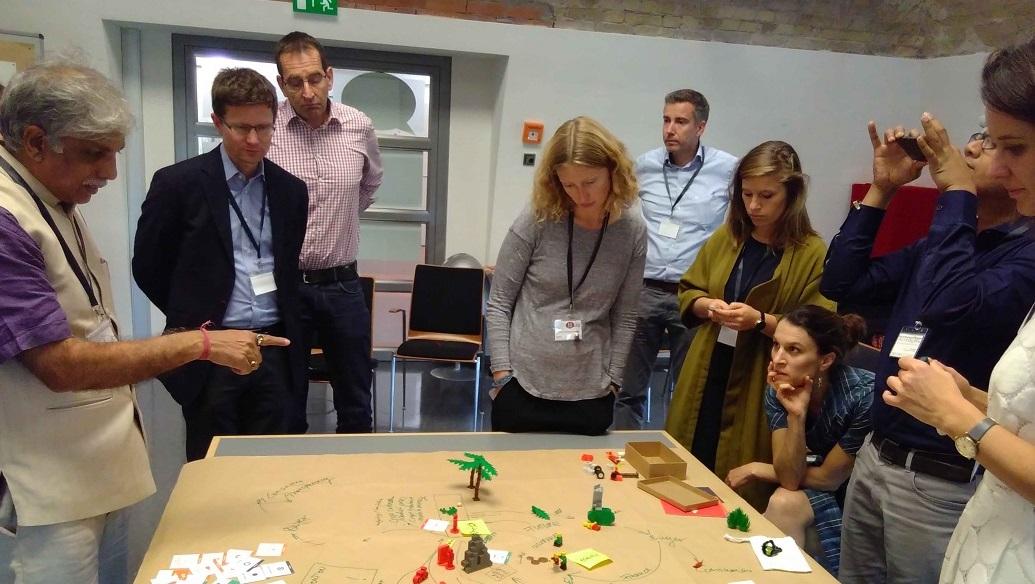Voices of Partners
To develop every issue if CLUED-iN, iBAN has cooperated with a network of partners: innovative and established organisations in the inclusive business ecosystem. Their insights and connections enabled the editorial team to stay up to date with important issues and developments. Many of them also contributed to iBAN’s programmatic work in policy development or business support.
Here, three of our partners share their thoughts about CLUED-iN and the pressing issues they are tackling in their work.
Daniella Mendoza, Project Manager, Inclusive Business Sweden
- Read Daniella's insights
-
Can you share your thoughts about CLUED-iN magazine? What did you like about it? What inspired you? Can you give an example?
The subjects featured in the CLUED-iN magazine are usually of high relevance to our work. The articles are quite visual, short, easy to read and inspirational. For some of us who focus more on the practice it is uncommon to have the time to continue to get updated and educated on the subjects we work on, and CLUED-iN magazine has made it easier for us to get quickly informed about what is happening through the short articles, stories and visuals. I usually focus on the subjects that are closer to my work and read in order to draw on inspiration for my work and open my mind as to what else could be done.
Which issues are most pressing for your work in inclusive business now?The most relevant subjects are those which connect directly to the work we are currently doing. At the moment, our Inclusive Business Partners team (formerly Inclusive Business Sweden) has projects which focus on: agri-food in East-Africa; the natural fiber value chain in Bangladesh; circular and sustainable sanitation in Uganda; impact investing strategy and road-maps; general business support to companies in Sweden and abroad; sustainable forestry and waste management in Ghana, just to name a few. Beyond that, the most pressing issues in my opinion are: the economic recovery of lower income people that are being affected by the economic shocks caused by Covid and the invasion of Ukraine, food safety in lower income markets, and merging of the environmental agenda with the inclusive business agenda.
How do you see inclusive business evolving in the future?The hope is that in the future inclusive business becomes more mainstream, with more established medium and larger businesses taking the responsibility and the opportunity of being inclusive and environmentally conscious. Also, I personally believe that the concept of inclusive business should inherently and explicitly address the environmental challenges of our times.

"One of the pressing issues or question marks, is if inclusive businesses in Europe are losing momentum due to the world challenges of Covid and the Russian invasion."
Dr. Christina Tewes-Gradl, Founder and Managing Director, endeva
- Read Christina's insights
-
Can you share your thoughts about CLUED-iN magazine? What did you like about it? What inspired you? Can you give an example?
The magazine always provided new and interesting examples of inclusive businesses around the world. It was great to hear from the entrepreneurs via the interviews. This space is very dynamic!
Which issues are most pressing for your work in inclusive business now?We are facilitating system innovation processes. We realized that inclusive businesses often get stuck because, although their solution may be revolutionary, others are not “playing along.” Our ii2030 process is a way to align stakeholder perspectives and roles, and this helps to leap-frog to the future systems we aspire to.
How do you see inclusive business evolving in the future?Inclusive business is becoming mainstream. Inclusion is a priority today, next to solutions that contribute to environmental regeneration. We will see new policies as well as new forms of ownership, financing and consumption that drive businesses towards more inclusive practices.

"Inclusion is a priority today, next to solutions that contribute to environmental regeneration."
Fernando Casado Cañeque, Founder and Director, GlobalCAD
- Read Fernando's insights
-
Can you share your thoughts about CLUED-iN magazine? What did you like about it? What inspired you? Can you give an example?
I liked the professionals that you were able to engage, as they represented the leaders of the IB movement generating content and transforming the sector. From this, I was able to keep updated with successful case studies, tools and initiatives that were at the forefront of the action promoting IB.
Which issues are most pressing for your work in inclusive business now?Right now, we are focused on tool development, adapting initiatives so they can be used by SMEs and the linkages between IB and climate change in order to respond to the climate emergency.
How do you see inclusive business evolving in the future?I think there is a big evolution moving towards strengthening the linkages between IB and climate change in the framework of the green transition, as well as the gender inclusion component.

Center of Partnerships for Development (GLOBALCAD)
"I think there is a big evolution moving towards strengthening the linkages between IB and climate change in the framework of the green transition, as well as the gender inclusion component."
